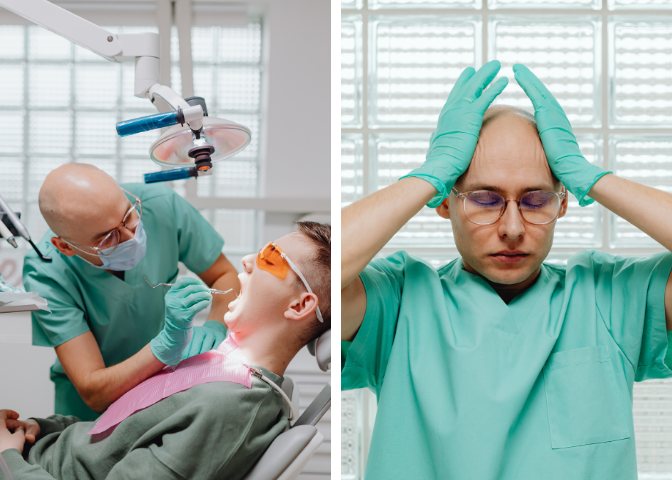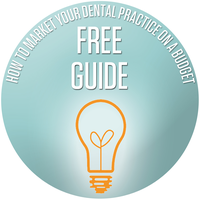
Dentistry is one of the world’s most stressful jobs. The levels of burnout that dentists face each day is alarming but should come as no surprise. Each day you manage any number of concerns, such as patient complaints, managing treatment plans, and working in an isolated environment.
Once stress reaches overwhelming levels, burnout can set in. This can hinder your job performance, impacting you, your team, and your patients. It's crucial to realize that there are actionable steps you can take to address and alleviate the effects of stress and burnout.
While stress is inevitable in this profession, it's crucial to be proactive in recognizing the early signs of burnout. Remember, you don't have to navigate this journey alone. Lean on your team, loved ones, and friends for the support you need to overcome these challenges.
Continue reading to discover the warning signs of dentist burnout and learn effective strategies to improve both your professional life and overall well-being.

Dentistry Burnout by the Numbers
Dentists globally are experiencing burnout and require assistance. Numerous studies highlight concerning trends that demand our attention. Here are some key statistics:
- The percentage of dentists diagnosed with anxiety more than tripled in 2021 compared to 2003
- Over one in five dentists meet the criteria for moderate clinical depression.
- People working in dentistry and healthcare are among a list of 20 professions noted by the CDC with concerning suicide rates. However, more hard evidence is needed to explain why that is.
- For dentists in their first five years of practice, the biggest worry is making a mistake (42%).
- Dentists are around 50% less likely to seek help and tend to be more isolating.

Signs of Burnout
Dentists encounter distinct obstacles and pressures. By being aware of the warning signs of burnout, you can identify them as they arise. The objective is to proactively take steps and reach out for assistance before the stress escalates further.
Common indicators of burnout frequently mentioned by dentists include:
- Feeling drained and emotionally spent at the end of the day
- Frustration arising when patients disregard your guidance
- Pulling away from loved ones, seeking solitude
- Sensing work as a heavy load without fulfillment
- Contemplating a career switch or walking away from work entirely
If you need more guidance about burnout, the ADA has created an online Dental Burnout Self-Assessment.

Perfectionism and Work/Life Balance
It is interesting to note that some of the qualities of successful dentists also contribute to stress. Traits like perfectionism and attention-to-detail make dental professionals vulnerable to burnout, anxiety, and depression.
According to the Dental Defence Union (DDU), 45% of dentists feel they are unable to spend adequate time with patients. Meanwhile, 33% feel they are unable to do their jobs effectively.

Complaints and Litigation
Complaints in the dental field are often brought before state dental boards, signifying a crucial and weighty issue. The decisions made by these boards can have substantial financial implications, potentially restricting your practice and tarnishing your professional reputation.
To effectively handle dental board complaints, it is essential to adhere to any directives or penalties given and uphold detailed and precise documentation for each patient interaction and appointment. For more tips, there is an ADA Tip Sheet you can follow.

Red Tape and Bureaucracy
Navigating through bureaucracy can be a daunting challenge for dental professionals, as it has the potential to disrupt work processes and overall operations. The administrative burdens faced by dentists can not only interfere with patient care but also influence team morale. Finding the right balance between meeting regulatory requirements for patient safety and managing administrative tasks is crucial in maintaining a smooth practice flow.

Inflation
Inflation is a top-of-mind concern for dental professionals. Inflation in the US was hovering around 8.2% in 2022, with dentists reporting decreases in reimbursement and profits. However, the rate for dental services was well below the national rate at 4.7%.
While you may not have control over the financial market as a dental professional, there are proactive steps you can take to ensure the success of your practice. Consider implementing strategies like offering teledentistry services, extending your clinic hours, nurturing existing patient connections, and prioritizing the well-being of your team. These initiatives can help you stay competitive, attract more patients, and maintain a thriving practice environment.

Substance Abuse
The stressors associated with the field can have a large impact on dental professionals and lead to substance abuse. According to data, alcohol (37%) and opioids (31%) are the most used substances in the dental profession. The good news is that addiction is a treatable disease, and many treatment options exist to help. Organizations like the CDC and American Addictions Centers have tips and resources.

How You Can Manage Your Burnout
The ADA has steps you can take to mitigate burnout and improve your work-life balance:
- Define the type of dentistry you want to practice.
- Take frequent breaks from work - daily, weekly, or quarterly.
- Stay engaged and don’t isolate.
- Develop a collegial community.
- Take care of self and family.
- Integrate yoga, breathwork or meditation into your routine.
- Pursue a spiritual life and gratitude.
- Regularly unplug from technology.
- Check in with a mental health professional.

When and How to Ask for Help
Being a dental professional often means dealing with stress as part of the job. While these feelings are common among colleagues, many dentists may hesitate to seek professional support. Although we can handle some stress on our own, there comes a point where the burden becomes too heavy to bear alone.
If you find yourself experiencing burnout, it's crucial to seek help. While asking for assistance may feel uncomfortable, it is not a sign of weakness. Seeking support shows your dedication to your patients, loved ones, and yourself. It demonstrates your commitment to bringing your best self to work, no matter what it takes.

Satisfaction in Dentistry
As stressful as your job can feel, it’s not all doom and gloom. Reports show that many dentists live happy and fulfilled lives and are satisfied with their careers overall.
In one study dentists rated their career happiness at three out of five stars. Another study by the ADA ranked the happiness of dentists as above average for all health professionals. Contributing factors included their patients, job satisfaction, and income.
Dentists may be seen as superheroes, but that doesn’t mean you have to carry the weight of the world on your shoulders. Burnout is not a reflection of your capabilities, but there are steps you can take to combat stress and reignite your passion for your work. Your patients, family, and friends deserve the very best version of you. Most importantly, you owe it to yourself to be the best you can be.
Interested in becoming a part of a network that prioritizes your needs? Partner with Solstice to gain access to competitive compensation, a nationwide membership base, and increased exposure for your practice among other top healthcare providers. Connect with our dedicated provider relations team at 1.877.760.2247 or email providerrelations@solsticebenefits.com.
Already in the Solstice network? Search to see if you're part of the Solstice dental network. You can also go to https://www.mysolstice.net/ or call us at 1.877.760.2247.



